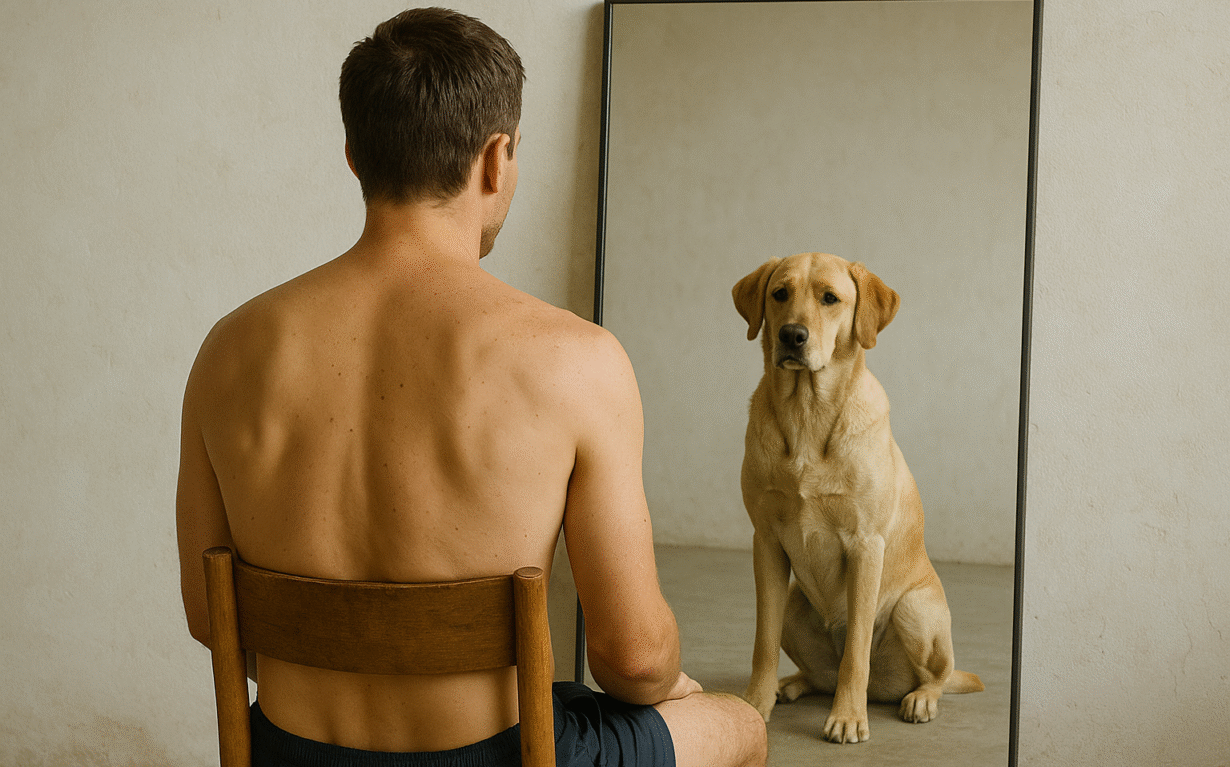When we observe dogs—not as pets, but as animals stripped of training, jobs, or tricks—we find a life reduced to four basic behaviors:
- Seeking sex
- Searching for food or eating
- Playing with others
- Lying around without motivation
These are not choices. They are cycles, inscribed by evolution, driven by reward, and reinforced by repetition. Dogs do not question their actions. They do not narrate them. They do not ask if they are living authentically. They just are.
Now turn the lens to humans.
The surface appears more complex: careers, ideologies, love stories, aspirations. But peel away abstraction, and human life too runs on a loop:
- Desire
- Consumption
- Stimulation
- Inertia
We pursue sex—directly, or through beauty, power, attention.
We earn, hoard, and consume—food, money, information.
We play—sports, games, gossip, or digital simulations.
And we collapse—numbed by exhaustion, guilt, or aimlessness.
Structurally, the loop is identical. The difference lies not in behavior, but in awareness. The human brain developed the ability to observe itself, and in doing so, birthed a split: between action and meaning, drive and narrative.
We do not merely live—we must make sense of living.
This is where the loop deepens. We don’t just eat—we diet, brand, and post.
We don’t just rest—we call it self-care, laziness, or recovery.
We don’t just play—we monetize it, or rank it, or ritualize it.
And above all, we don’t just exist—we seek recognition for existing.
Do you feel resistance—or is something clicking into place?
This post was written to explore a deeply philosophical observation: that much of human life—beneath our complex social roles, ambitions, and self-narratives—follows the same basic behavioral loop as other animals. The comparison is not meant to insult or degrade, but to reveal something essential:
That we often live compulsively—seeking sex, food, stimulation, and rest—without fully noticing the loop we’re in.
The essay introduces meta-awareness as a tool for liberation, not judgment. By making the loop visible, it becomes possible to act outside of it—not as an animal, not as a performer, but as a conscious form-based being.
If this feels confrontational, it’s because it questions the hidden structure of daily life—a structure we rarely stop to see.
Eidoism is not trying to reduce humans to animals.
It’s offering a way out of unconscious performance.
To live without being owned by the loop.
The Hidden Circuit
At the heart of modern behavior is not need, but validation.
Not the act, but its performance.
We live inside a feedback loop where being seen confirms existence.
This is the Loop of Recognition.
It is unconscious, recursive, and socially rewarded. You choose your job, your partner, your clothes, your opinions—often not from form or need, but from an internal script that says:
If I am not seen, I am not real.
What dogs reveal, in contrast, is the absence of narrative. They do not construct identity from behavior. They do not pretend. They do not need meaning beyond instinct.
This does not make them lesser. In a way, it makes them free.
Meta-Awareness: The Adjacent Exit
If the loop is unconscious, how can it be left?
Eidoism proposes no external escape. It offers no utopia, no system to replace the old.
It proposes only one shift: meta-awareness.
Meta-awareness is the ability to observe the loop while being inside it.
It does not kill desire. It does not eliminate action.
It changes the source of value.
From recognition → to form.
From performance → to structure.
From identity → to necessity.
In this space, you still eat, love, create, rest—but not to be seen. Not to display.
You act because the act has structural integrity.
Not symbolic reward.
To see the loop is not to transcend life, but to inhabit it differently.
Like a dog—who lies still without guilt.
But with awareness—not ignorance.
Eidoism: A Form Without Applause
Eidoism does not offer a new mask. It removes the need for one.
It begins where systems fail: at the level of why we act.
It invites not transformation, but disidentification.
To act from clarity, not compulsion.
This is not a return to animality. It is the full arc of human potential:
To recognize the loop, and refuse to be owned by it.
Not a revolution.
A quiet refusal.
A life beside the loop.
Still. Unperformed. True.


